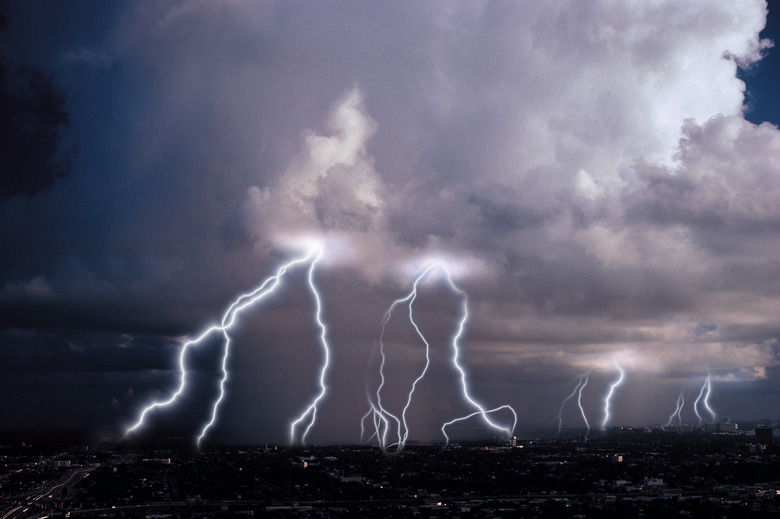How To Size A MOV For Surge Protection
A metal oxide varistor, or MOV, is an electronic component that protects equipment from voltage surges in a power line, such as from lightning strikes. Simple and inexpensive, the MOV absorbs the energy in a surge, preventing it from damaging other devices in a circuit. Excessive voltage triggers the MOV into action, so to size it for surge protection, select a voltage rating suitable for the equipment you want to protect. In addition to voltage, MOVs have a maximum energy rating, above which they will burn as a fuse does. The energy depends on the equipment and environment in which the MOV will work.
Step 1
Examine the electronics schematic and determine the working voltage of the circuit. For alternating current, or AC, divide the RMS, or root mean square, voltage by .707 to obtain a peak value. For example, dividing 110 volts AC by .707 gives 156 volts. For direct current, or DC, simply use the voltage specified on the schematic. As various parts of a circuit may have different voltages, make sure you identify where in the circuit the MOV will go.
Step 2
Multiply the working voltage by a factor of 4 to get the MOV's clamping voltage. This is the voltage at which the MOV begins to absorb energy. Below this voltage, it has no effect on normal circuit operation. It only acts when the voltage spikes above a threshold value.
Step 3
Estimate the MOV's energy rating in units of joules. This is the electrical energy that the MOV can safely absorb at least once before failing. You can calculate the energy by multiplying peak surge volts by amps, and then by seconds of time. For example, 1,000 volts x .1 amps x .01 seconds equals one joule. To estimate, low- to medium-power 110-volt AC equipment may have MOVs rated for between 10 and 200 joules. Small DC-powered devices may need an MOV rated for a few joules.
Step 4
Find suitable MOVs in the electronics component distributor catalog. They will be located in a section such as "circuit protection," which also includes fuses and circuit breakers. The catalog organizes the MOVs by manufacturer, voltage and energy rating, and physical package type.
Things Needed
- Electronics schematic
- Electronics component distributor catalog
TL;DR (Too Long; Didn't Read)
You can combine two or more MOVs for greater flexibility in protecting your circuit from surges. MOVs connected in a series circuit, or one after the other, will multiply the overall clamping voltage. For example, 2 MOVs rated at 500 volts will clamp at 1,000 volts. Connected in parallel, they can dissipate more energy. Two 100-joule MOVs will absorb up to 200 joules of energy.
Cite This Article
MLA
Papiewski, John. "How To Size A MOV For Surge Protection" sciencing.com, https://www.sciencing.com/size-mov-surge-protection-8708803/. 24 April 2017.
APA
Papiewski, John. (2017, April 24). How To Size A MOV For Surge Protection. sciencing.com. Retrieved from https://www.sciencing.com/size-mov-surge-protection-8708803/
Chicago
Papiewski, John. How To Size A MOV For Surge Protection last modified March 24, 2022. https://www.sciencing.com/size-mov-surge-protection-8708803/
